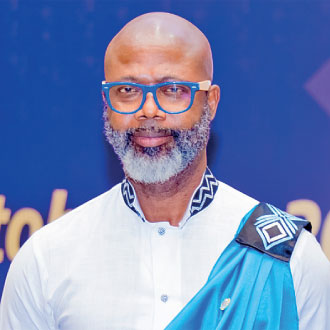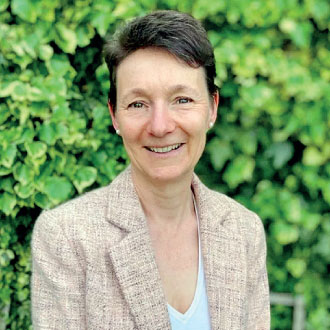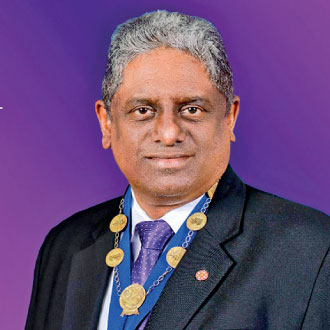Thursday Feb 19, 2026
Thursday Feb 19, 2026
Monday, 9 December 2024 00:10 - - {{hitsCtrl.values.hits}}

CILT International President Chief Tete Owusu Nortey

CILT International Secretary General Sharon Kindleysides

CILT Sri Lanka President Chandima Hulangamuwa
By Darshana Abayasingha
The Chartered Institute of Logistics and Transport (CILT) International will hold its next global conference in Sri Lanka next year.
Its leadership team consisting of President Chief Tete Owusu Nortey and Secretary General Sharon Kindleysides, were in Sri Lanka recently to look at preparations, as the organisation takes a long-term view to grow the global logistics and transport industry to new heights.
Speaking to the Daily FT, CILT International President Chandima Hulangamuwa said, they are pleased with preparations and the potential Sri Lanka offers to the conference participants, adding it would be an ample opportunity for the island nation to showcase capacities to the global shipping trade. Over 300 foreign delegates from all over the world are expected to participate at the forum.
Hulangamuwa underscored the opportunity to showcase Sri Lanka, which has the 22nd busiest port in the world. He noted this is a good image-building exercise for the country, as the world could witness how the country serves as a centre in the logistics business. “The previous convention was held in China, and Sri Lanka won the opportunity to host the next global conference as part of an open bid. This will be a great networking and knowledge sharing session, which is also good for our tourism and economic aspects. The shipping community knows us as a fantastic shipping location, and now the supply chain will have a chance to see us and understand our expertise even better,” Hulangamuwa said.
The CILT Sri Lanka President’s comments were supported by the Secretary General of CILT International, who noted Sri Lanka sits in a pivotal part of the world handling 85% transshipment cargo with plenty of experience in the region. She stated that if a land bridge to India were to happen the transport and logistics sector in Sri Lanka would “just explode” to unprecedented proportions, and lay the foundation for other infrastructure expansions.
Commenting on the future and expansion of the port, Kindleysides added greater adoption of automation and digital systems will change the nature of the workforce, and turnarounds would become much faster. “One more boat coming in during the week can make a huge difference to things. So, building or expanding the port must be done with that in mind.” She explored possibilities with autonomous cranes, which are already operational in India, and develop people with necessary skills in data analytics to boost the industry over the next five to ten years. “There’s no one size fits all. So, we need to prioritize based on our strengths and vision. With automation you can even get women into the business,” Kindleysides averred.
The Secretary General of CILT also pointed to the benefits of getting freight off roads and into trains, whereby they become far more predictable with the added benefit of loading more containers onto a train as opposed to lorries. Commenting on ongoing efforts to decarbonize the shipping industry she pointed to difficulties in the maritime sector and procuring new ships is expensive business. However, Kindleysides enthused at the prospect of new propulsion systems and said this is a global concern that will need addressing.
Commenting on Sri Lankan operations, the CILT Sri Lanka President said his agency is working tirelessly to elevate the country’s position on the Logistics Performance Index, where Sri Lanka is ranked 73rd despite being the 22nd busiest port in the world. Hulangamuwa said Sri Lanka has good infrastructure to support its logistics requirements, but the issue lies with Customs.
“Even India is ranked higher than us. We have good infrastructure in the port, an airport that is not bad and a transport system that works. Customs present the problem. Our Customs ordinance is very old, and people have been talking of a new ordinance but that is facing challenges. We must have zero tolerance on corruption, not only by the government and its bureaucrats but even users. Prior to 2020, no one wanted to do electronic order processing no matter how much we tried. We were pushing for online transfers and they wouldn’t accept that. Thanks to COVID-19 we were able to do it. Now everyone is using electronic delivery orders, and about 75% of transfers happen online. So, if all of this continues, we could improve our ranking. The challenges for Sri Lanka to grow are minimal as long as we don›t have any unforeseen challenges be it economic, political or otherwise,” he said.
Promoting younger diverse female talent
Hulangamuwa added Sri Lanka is not cheap when it comes to labour, and despite the push towards automation there is also reluctance due concerns over job loss. However, he points out that automation will also create avenues for new jobs and these changes will come to the Colombo Port as well. He noted the Colombo Port even has women crane drivers, which is a focus area for CILT International.
CILT International President Chief Tete said: “As a global organisation, we want more women in the industry. Women can be the software where men act as hardware. At CILT, we focus so much on educating and empowering women to get in through the systems. We want to make sure when we leave, the next generation will be ready to take up the industry and that women are a big part of it. We are purposefully empowering women and making sure everyone is empowered.”
His views were echoed by Kindleysides who said: “We are very aware of promoting younger diverse female talent. In Malawi we had very young mothers engaging with us. What we are saying is; have you thought of logistics? Putting women into buses is something I’m involved in the UK. We are looking at the design of the cab, the lorry or the bus to see how we can encourage them to take up jobs. To see how we can create safe and empowering spaces for them. We have developed mentoring schemes. Each country has their own challenges in this area. In the UK we have about 10% of women in logistics but in Malaysia there is a huge number involved in comparison. This is an area we are looking to grow.”
Kindleysides added CILT is looking to expand its educational offering with syllabuses to expand awareness and appreciation of the logistics industry, also demonstrating how they could grow public transport. CILT is making case studies of the best examples and “professionalise this profession”. There is special emphasis on data analytics, and the body is sponsoring discussion on what the future will or can be.
“There are no boundaries really. I recommend young people to get into it. There are jobs pretty much forever. Up to 13% of the world’s population work in the supply chain and it should be higher. We see a lot more interest in what the supply chain is all about. People realized after the pandemic and the war they had not thought about enough where things come from. Consumers are also becoming impatient, they expect it to be there when they want to. Society is becoming everything just in time. Logisticians need to look at big data and try to second guess what’s going to happen, but things are fairly unpredictable,” Kindleysides added.
Speaking on his vision for CILT International and the industry at large, Chief Tete said empowering women is a key task, alongside education and awareness to prepare the next generation of logisticians. CILT is making itself more visible, and is increasingly touching every aspect of its value chain. Commenting on Ghana and the growth of Africa, Tete said Africa is booming and many countries are looking at a free trade control area to reduce bottlenecks for trade.
“Sometimes you have to go out of Africa to come back to another African country. We don’t have enough local flights. So, we are looking at changing that to a network and presenting ourselves as one. We are a global village and at CILT we want to make things much easier. We want to do the right things to help the industry grow and ensure seamless movement of goods and people within and between countries. I want to make the industry well known, where youngsters will think about jobs in logistics and transports. I want it to be aspirational.”